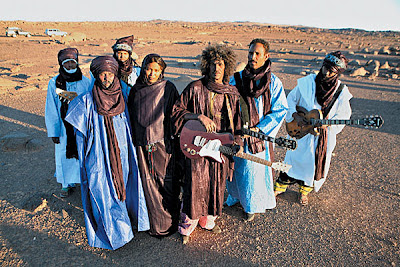From this side of the world watching the situation in Mali unfold over the past few weeks has been a complex and sobering experience. (In a nutshell, the chaos following a recent military coup in Bamako in the south facilitated capture of major cities in the north by Tuareg separatist rebels. This culminated in the declaration of independence of a Tuareg state in Timbuktu on April 6th. Meanwhile some 200,000 Malians have fled their homes in the deadly hot season. Little information is available about where they are or how to help them.) Although we try our best to contextualize what we listen to, delving into the history and culture that necessarily surrounds the music, it seems that it is impossible to avoid at least partially sculpting our understanding to fit the narratives that make for the best, the most satisfying, the most interesting story. The media landscape in which we interact with this music helps of course; so few artists are able to penetrate the opacity of distance and culture, and those that are successful need something to catch our eyes.
This is a well-known statement, one that will not seem particularly remarkable to anyone who has spent much time following the music press. What is far more rare is the vertiginous experience of having the front page of the newspaper suddenly come into conversation with the review section of Pitchfork or Rolling Stone, the results of which clearly reveal the extent to which the music (just like any music made anywhere) are the artifacts of a larger world that they do not cleanly encompass and that they cannot clearly reflect.
Tinariwen, a group that Afropop has written about and aired frequently in the past, are a near perfect case in point. When they first gained a western following, they were touted as true-life rock rebels, musicians whose already fantastic music was spiced with a romantic image of nomadic warriors summoning the blues from the desert sand. To their credit, the group never made any excuses for their political past, and they have quite reasonably been entirely supportive of the Tuareg’s new military success.
What is startling is to realize the extent to which sophisticated music fans uncritically accepted this narrative almost blindly. Not because it is necessarily incorrect, or that that the group has somehow hoodwinked the culpable west, but because there has been so little consideration of the broader context in which any real-world rebellion must take place. The real world is a mind-boggingly complex place, and no group is ever entirely right or wrong in a place where relationships can easily go back centuries. We all too easily came to think of Tinariwen as cartoon heroes, fighting a war that we did not understand. The news from Mali makes that all too clear.
So how do we, music journalist living in the states, approach this subject? Clearly, the situation is much too multi-faceted and dense to pass judgment or take sides. However, to not, at least, acknowledge the situation is also something of a journalistic and moral misstep. Over the past week Tinariwen has been in the news not so much for their comments on the Tuareg situation in Mali, and not so much for their cultural background and connection with the rebel forces, but because they released a new live video with members of Red Hot Chili Peppers and are touring Europe with them. Not to mention that two of the main members, the bandleader Ibrahim and the acoustic guitarist Elaga Al Hamid—are reportedly stuck in refugee camps near the Algerian border and have been since February. The lack of acknowledgement by so many music publications covering Tinariwen is a shame and essentially taking on a western-centric role of picking and choosing what parts of the narrative they want and essentially re-contextualizing and re-writing the history that is playing out.
Tinariwen’s music is deeply rooted in their culture and their history of rebellion and fighting for what they believe (see their comments on the situation via Africa is a Country). Now their thematic elements of their music and their words are playing out in real-time before our eyes in the deserts of Northern Mali. Yet, so much of their coverage of late has chosen, for whatever reason purposeful or not, to ignore any acknowledgement of it. Does this make sense? No, it doesn’t. To be frank, it’s lazy. And in that laziness, a new and inaccurate narrative is being written.









